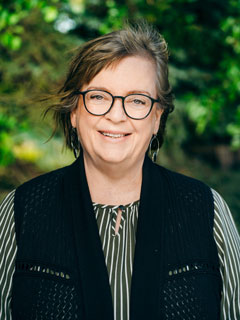What is Marriage & Family Therapy?
Request More Information
As a Marriage and Family Therapist (MFT), you are specifically trained to treat mental and emotional concerns individually, relationally, and systemically. Whether a concern is related to work or home, parent-child, immediate/extended family, partner/couple or other contemporary relationship, an MFT focuses on providing holistic care from a systemic perspective that is inclusive of a client’s relationships and environment.
MFTs are mental health professionals who receive training in both psychotherapy and family systems. They are trained and equipped to recognize how relational dynamics impact mental health as well as how mental health impacts relationships. While treatment focuses primarily on the individual(s) in the room, awareness of the broader perspective of the systems surrounding those individuals is important to successful therapy outcomes.
Demand for licensed marriage and family therapists continues to increase. According to The U.S. Bureau of Labor Statistics, jobs for marriage and family therapists are expected to grow by 14% (faster than average) by 2031.
“We are proud to offer a program that trains new therapists to support healthy change while honoring their client’s lived experience.”
- Deb Polacek, LMFT, AAMFT Approved Supervisor,
Associate Dean and Program Director
What we offer to you
Learn On-Site from Practicing Professionals
Students learn within a community of colleagues in our cohort-based program. We limit enrollment to allow for small class size and individual attention. All Marriage and Family Therapy (MFT) faculty have extensive clinical experience in their subject area and maintain active therapy practices. With evening classes, learning is geared toward working adults who need flexibility. Full-time students can complete the program in as few as 22 months. Most part-time students graduate within 3 years.
Program-Coordinated Clinical Placement
Edgewood College’s Marriage and Family Therapy program offers students an extraordinary advantage in having access to their own training facility. The Family Center is an outpatient, community-based mental health center that offers low-cost supportive therapy for individuals, couples, and families. This facility continues to be integral to the success of our program as it provides a supervised location for active therapy practice that supports both student learning and the mental health needs of the community.
Unlike many other programs, the MFT program will connect you to the best internship opportunity so your focus can remain on the learning experience. The MFT Program has built an extensive list of partnership placement options managed by The Family Center which will assist students in fostering additional skill development in areas of personal interest. Internship placement will always seek to connect students with hands-on experiences that complement the systemic approach to therapy.
Postgraduate Support in Licensure Application Process
Your dream job begins with a plan. Faculty in the MFT program will walk alongside you – long after you have accepted your master’s degree. We understand that achieving your graduate degree is a big step – but it’s not going to be your last. We will support you in the application process for licensure, and in exploring that dream job. From networking to career exploration, MFT alumni receive wraparound postgraduate support. Our success is not only measured by your classroom experience.
A Program with History and Vision
The Marriage and Family Therapy program at Edgewood College has trained successful psychotherapists since 1996. With a “family systems” lens and a vision to bring mental health advocacy to the Greater Madison area, Dr. Peter Fabian founded both the academic program and The Family Center.
We blend the theoretical and therapeutic approaches within the “General Systems” paradigm, with the primary goal of clinical excellence in training within this field. Unlike other mental health disciplines where students may take one or two classes in how to work holistically and relationally with clients, our entire program focuses on training and education to work within this paradigm.
Program Handbook Graduate Achievement Data

48 Credits | 
Evening Classes offer Flexibility | 
Graduate in as few as 22 months | 
Internship Placement & Support |
“I specifically chose the Marriage and Family Therapy program for the systemic framework remembering that each person has an experience, has a previous relationship that shapes them. The program really helped me to remember just how important that is…”
Eric Baer ’19 Psychotherapist, LMFT
Loading...

 Eagle Athletics
Eagle Athletics
